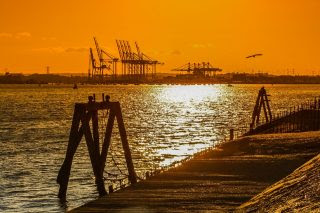The UK government has published the Clean Maritime
Plan, an ambitious plan to cut pollution from the country’s maritime sector.
Plan, an ambitious plan to cut pollution from the country’s maritime sector.
Launched by Maritime Minister Nusrat Ghani MP in
London, the plan says that all new ships for UK waters ordered from 2025 should
be designed with zero-emission capable technologies.
London, the plan says that all new ships for UK waters ordered from 2025 should
be designed with zero-emission capable technologies.
The government is also looking at ways to incentivize
the transition to zero-emission shipping and will consult on this next year.
the transition to zero-emission shipping and will consult on this next year.
The plan also includes a GBP 1 million (USD 1.25
million) competition to find innovative ways to reduce maritime emissions and
is published alongside a call for evidence to reduce emissions on UK waterways
and domestic vessels.
million) competition to find innovative ways to reduce maritime emissions and
is published alongside a call for evidence to reduce emissions on UK waterways
and domestic vessels.
The Clean Maritime Plan is part of the Government’s Clean Air Strategy, which aims to
cut down air pollution across all sectors to protect public health and the
environment. It will also help deliver the United Kingdom’s commitment to be net zero on
greenhouse gases by 2050.
cut down air pollution across all sectors to protect public health and the
environment. It will also help deliver the United Kingdom’s commitment to be net zero on
greenhouse gases by 2050.
“Our
maritime sector is vital to the success of the UK’s
economy, but it must do everything it can to reduce emissions, improve air
quality and tackle climate change,”
Maritime Minister Nusrat Ghani commented.
maritime sector is vital to the success of the UK’s
economy, but it must do everything it can to reduce emissions, improve air
quality and tackle climate change,”
Maritime Minister Nusrat Ghani commented.
“The
Clean Maritime Plan sets an ambitious vision for the sector and opens up
exciting opportunities for innovation. It will help make the UK a global hub
for new green technologies in the maritime sector,”
Ghani continued.
Clean Maritime Plan sets an ambitious vision for the sector and opens up
exciting opportunities for innovation. It will help make the UK a global hub
for new green technologies in the maritime sector,”
Ghani continued.
The maritime sector has already taken significant
strides to reduce emissions – hybrid
ferries are already being used in UK waters, including in the Scottish islands
and on cross-Solent journeys to the Isle of Wight. The Port of London Authority
also uses hybrid vessels.
strides to reduce emissions – hybrid
ferries are already being used in UK waters, including in the Scottish islands
and on cross-Solent journeys to the Isle of Wight. The Port of London Authority
also uses hybrid vessels.
Guidance has also today been issued to ports to assist
them in developing air quality strategies. This will both address their own
operations and support improving air quality across the country.
them in developing air quality strategies. This will both address their own
operations and support improving air quality across the country.
A further consultation to increase the uptake of low
carbon fuels will also take place next year.
carbon fuels will also take place next year.
“We
welcome the government’s Clean
Maritime Plan, which is a solid foundation on which the industry and government
must build,” Mark Simmonds, Head of Policy, at
the British Ports Association, said in a separate statement.
welcome the government’s Clean
Maritime Plan, which is a solid foundation on which the industry and government
must build,” Mark Simmonds, Head of Policy, at
the British Ports Association, said in a separate statement.
“Industry
will be responsible for delivering on the ambitions in this plan and the wider ‘net zero’
targets. As the plan rightly sets out, success will depend on long-term close
collaboration.”
will be responsible for delivering on the ambitions in this plan and the wider ‘net zero’
targets. As the plan rightly sets out, success will depend on long-term close
collaboration.”
Stating that the BPA is ready to work with the country’s government on these challenges,
Simmonds added: “The UK
has enjoyed a decades-long consensus that a market-led ports sector delivers world-class
infrastructure and services to the international shipping industry which
carries 95% of our trade. We believe that approach, in collaboration with the
Government, can be brought to bear to tackle humanity’s
greatest challenge.”
Simmonds added: “The UK
has enjoyed a decades-long consensus that a market-led ports sector delivers world-class
infrastructure and services to the international shipping industry which
carries 95% of our trade. We believe that approach, in collaboration with the
Government, can be brought to bear to tackle humanity’s
greatest challenge.”
Back in October 2018, Minister Ghani met for the first
time with the Clean Maritime Council to devise a strategy aimed at reducing
greenhouse gas emissions from the sector and improving air quality on and
around the UK’s waterways, ports and shipping lanes.
time with the Clean Maritime Council to devise a strategy aimed at reducing
greenhouse gas emissions from the sector and improving air quality on and
around the UK’s waterways, ports and shipping lanes.
The environment is also an important part of the
government’s Maritime 2050 strategy, a long term look at the opportunities for
the sector for the next 30 years.
government’s Maritime 2050 strategy, a long term look at the opportunities for
the sector for the next 30 years.
World Maritime News.


































































